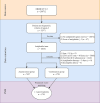Impact of P2Y12 inhibitors on clinical outcomes in sepsis-3 patients receiving aspirin: a propensity score matched analysis
- PMID: 38862910
- PMCID: PMC11167871
- DOI: 10.1186/s12879-024-09421-x
Impact of P2Y12 inhibitors on clinical outcomes in sepsis-3 patients receiving aspirin: a propensity score matched analysis
Abstract
Background: Sepsis is a life-threatening disease accompanied by disorders of the coagulation and immune systems. P2Y12 inhibitors, widely used for arterial thrombosis prevention and treatment, possess recently discovered anti-inflammatory properties, raising potential for improved sepsis prognosis.
Method: We conducted a retrospective analysis using the data from Medical Information Mart for Intensive Care-IV database. Patients were divided into an aspirin-alone group versus a combination group based on the use of a P2Y12 inhibitor or not. Differences in 30-day mortality, length of stay (LOS) in intensive care unit (ICU), LOS in hospital, bleeding events and thrombotic events were compared between the two groups.
Result: A total of 1701 pairs of matched patients were obtained by propensity score matching. We found that no statistically significant difference in 30-day mortality in aspirin-alone group and combination group (15.3% vs. 13.7%, log-rank p = 0.154). In addition, patients received P2Y12 inhibitors had a higher incidence of gastrointestinal bleeding (0.5% vs. 1.6%, p = 0.004) and ischemic stroke (1.7% vs. 2.9%, p = 0.023), despite having a shorter LOS in hospital (11.1 vs. 10.3, days, p = 0.043). Cox regression showed that P2Y12 inhibitor was not associated with 30-day mortality (HR = 1.14, 95% CI 0.95-1.36, p = 0.154).
Conclusion: P2Y12 inhibitors did not provide a survival benefit for patients with sepsis 3 and even led to additional adverse clinical outcomes.
Keywords: Bleeding; Inflammation; P2Y12 inhibitors; Sepsis; Thrombosis.
© 2024. The Author(s).
Conflict of interest statement
The authors declare no competing interests.
Figures



Similar articles
-
Third-Generation P2Y12 Inhibitors in East Asian Acute Myocardial Infarction Patients: A Nationwide Prospective Multicentre Study.Thromb Haemost. 2018 Mar;118(3):591-600. doi: 10.1055/s-0038-1626697. Epub 2018 Mar 13. Thromb Haemost. 2018. PMID: 29534250
-
Clinically significant bleeding with low-dose rivaroxaban versus aspirin, in addition to P2Y12 inhibition, in acute coronary syndromes (GEMINI-ACS-1): a double-blind, multicentre, randomised trial.Lancet. 2017 May 6;389(10081):1799-1808. doi: 10.1016/S0140-6736(17)30751-1. Epub 2017 Mar 18. Lancet. 2017. PMID: 28325638 Clinical Trial.
-
Pharmacodynamic Effects of Vorapaxar in Prior Myocardial Infarction Patients Treated With Potent Oral P2Y12 Receptor Inhibitors With and Without Aspirin: Results of the VORA-PRATIC Study.J Am Heart Assoc. 2020 Apr 21;9(8):e015865. doi: 10.1161/JAHA.120.015865. Epub 2020 Apr 20. J Am Heart Assoc. 2020. PMID: 32306797 Free PMC article. Clinical Trial.
-
Monotherapy with a P2Y12 inhibitor or aspirin for secondary prevention in patients with established atherosclerosis: a systematic review and meta-analysis.Lancet. 2020 May 9;395(10235):1487-1495. doi: 10.1016/S0140-6736(20)30315-9. Lancet. 2020. PMID: 32386592
-
Use of antiplatelet agents in sepsis: a glimpse into the future.Thromb Res. 2014 Feb;133(2):131-8. doi: 10.1016/j.thromres.2013.07.002. Epub 2013 Oct 6. Thromb Res. 2014. PMID: 24103487 Review.
References
MeSH terms
Substances
LinkOut - more resources
Full Text Sources
Medical

